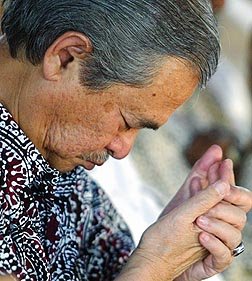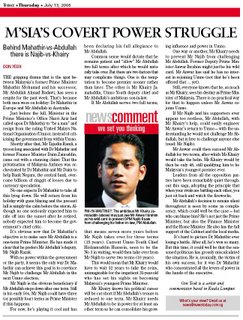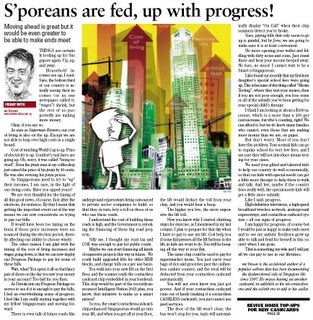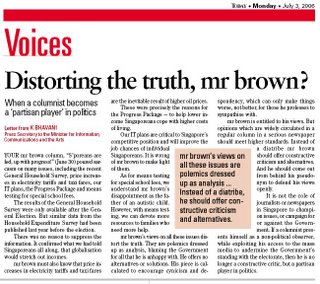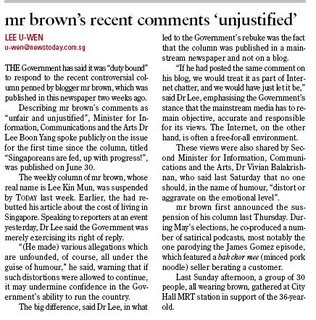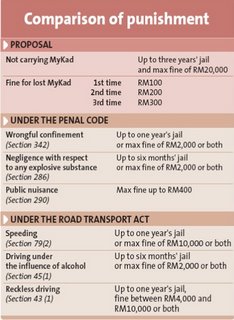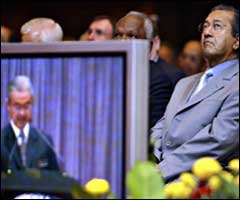A Solution to the Article 11 Impasse
The Federal Constitution is flawed.
On one hand, it states that Islam is the religion of the country and that Islamic law and the Syariah Court holds sway over all matters pertaining to Islam. On the other hand the Constitution also states that all Malaysians shall enjoy the freedom to profess whatever religion they wish. The Constitution also holds itself as the highest law in the land.
Muslims feel aggrieved because of 2 things.
1. If the part regarding the freedom of religion in the Constitution is deemed to apply to Muslims, it opens the door to legal apostasy which cannot be challenged in the Syariah court.
2. The Constitution was drafted by men. The Quran, and by extension Islamic laws, descended from god. The Quran whups the Constitution, no contest.
However, that view conveniently forgets that nearly 40% of Malaysian are not Muslim. And for them, the Quran does not and must not supersede the Constitution.
But is there no possible reconciliation, like the Islamists and PEMBELA will have you believe?
NO, I believe that there is a way out. A win-win for everyone.
Let's see.
Non-Muslims are not concerned about the affairs of Muslims or the application of Islamic laws on Muslims. What they are concerned about, is when the affairs of Muslims intersect with the affairs of non-Muslims.
When that happens, the obvious result is that Muslims feel that Islamic laws and the Syariah Court should have jurisdiction - due to the simple fact that a Muslim is involved. And non-Muslims feel that the Constitution and the Federal court should have the final say - due to the equally simple fact that a non-Muslim is involved.
Herein, lies the problem.
So, instead of focusing on whether the Constitution should have precedence over Islamic law, or vice versa...
WHY DON'T WE, INSTEAD, FOCUS ON MINIMISING OR ELIMINATING THE INTERSECTION OF LEGAL AFFAIRS BETWEEN MUSLIMS AND NON-MUSLIMS?
How?
The paths of Muslims and non-Muslims converge when there is:
(a) Conversion of a non-Muslim to Muslim, and
(b) Marriage of a non-Muslim to a Muslim, which results in (a) Conversion.
So, the main issue is Conversion.
Conversions get complicated when the converts leave loose ends when they convert. For instance, what happens when a person converts but his/her non-Muslim spouse doesn't? This happens quite often when someone converts and doesn't tell their non-Muslim spouse until after the conversion. But by then, it's too late.
"If the pau's cooked, it's too late to take out the char siew" as my granddad used to say. Ok... maybe I just made that up. But let's not get bogged down.
What happens then? What happens to any kids they might have? What happens to their assets? Should the Syariah court or secular court decide on any disputes?
I think that since conversion is capable of causing so many subsequent problems if it's not done properly, the answer lies in tightening the conversion process in the first place.
For instance, currently, a person who wants to convert can do it all by his/her lonesome with the aid of the religious department. And no effort is made to ensure that the convert informs everyone connected to him/her of the consequences of the conversion; and nothing is done to ensure that he/she has made adequate arrangements to resolve those affairs concerning his/her non-Muslim spouse, children, heirs and assets.
Making sure that the convert resolves all his/her non-Muslim affairs prior to his conversion is ALL IMPORTANT.
Why? Islam is a one way ticket. Once a Muslim, there's no turning back. The punishment for apostasy is death. Due to the deathly serious repercussions of an exit from Islam (apostasy), the entry into Islam (conversion) is just as, if not more serious and must be accorded an equally definitive process.
The process of conversion must include complete legal resolution of EVERY aspect of the prospective convert's non-Muslim life where it might become a matter of secular & Islamic contention in the future. Anything less and the conversion cannot take place. Anything less must invalidate the conversion attempt!
Therefore, the answer is to compel a prospective convert to satisfactorily resolve all his/her non-Muslim affairs before conversion, for example:
- legally divorcing his/her spouse if the spouse will not convert with him/her, and distributing their marital property according to secular law,
- producing a written agreement between the prospective convert and the spouse as well as other logical legal guardians (like grandparents and siblings) regarding the religious status of any of their children (this point is important because if the convert dies, and his children were converted as well, they cannot be cared for in a non-Muslim home, even if those people are the children's closest living relatives, including the non-Muslim biological parent).
- resolving in a secular court any possible future conflicts arising from property jointly owned by the convert and a non-Muslim, or any property of the convert where secular laws and Islamic laws will treat differently in the event that a non-Muslim lays claim to it (eg. heir, family, business partner etc).
There will be no more conversions at the deathbed, no more conversions for spontaneous marriages, no more quickie conversions period. This is very consistent with upholding the sanctity of Islam as it is the best guarantee that Islam embraces converts who sincerely love the religion. The stringent pre-conversion process helps Islam weed out those who want to convert for insincere ulterior motives, and these are most likely the ones who want to leave Islam later on when things don't turn out as they planned. The results of this process also greatly reinforces one of the basic tenets of Islam which is to be fair and just in its dealings with all people, including non-Muslims.
Therefore, if we require that all possible affairs of prospective converts which entangle non-Muslims to be resolved before conversion, the effect will be that:
- all Muslims will be subject only to Islamic laws and the Syariah Court on matters concerning religion, as is their wish. This is possible as converts will only be those who satisfy the stringent conversion requirements. Resulting in no possibility that they may become subject to the secular court.
- all non-Muslims will be subject only to the Constitution, secular laws and courts, as is their wish. This is possible as any non-Muslims with affairs connected to converts, would have had those affairs already been resolved in a secular court before the said conversion. Resulting in no possibility that they may become subject to Islamic laws and the Syariah court.
Well, everyone's happy except those in the religious department, maybe. They'll have a lot more due diligence work to do, besides catching adulterers, issuing fatwas and campaigning against Kongsi Raya.



